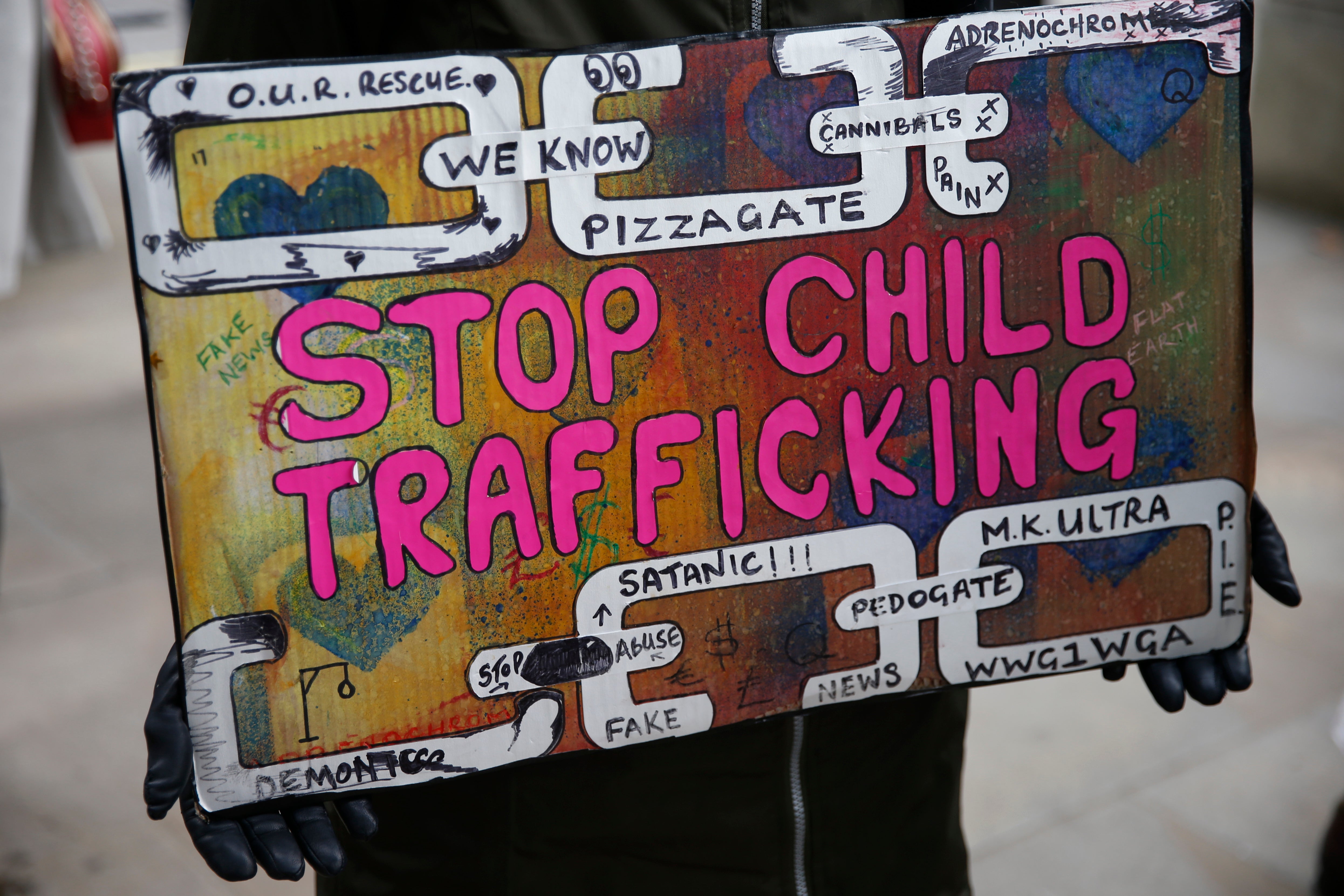QAnon: One in four Britons believe conspiracy theories linked to movement
Third of under-35s suspect influential elites to be members of secret Satanic cults, according to Hope Not Hate research

Your support helps us to tell the story
From reproductive rights to climate change to Big Tech, The Independent is on the ground when the story is developing. Whether it's investigating the financials of Elon Musk's pro-Trump PAC or producing our latest documentary, 'The A Word', which shines a light on the American women fighting for reproductive rights, we know how important it is to parse out the facts from the messaging.
At such a critical moment in US history, we need reporters on the ground. Your donation allows us to keep sending journalists to speak to both sides of the story.
The Independent is trusted by Americans across the entire political spectrum. And unlike many other quality news outlets, we choose not to lock Americans out of our reporting and analysis with paywalls. We believe quality journalism should be available to everyone, paid for by those who can afford it.
Your support makes all the difference.One in four people in the UK believe in conspiracy theories propagated by QAnon, the movement centred on a supposed plot involving a global cabal of elite, child-abusing Satanists, a survey has found.
Twenty-six per cent of Britons agree with claims that celebrities, politicians, and prominent media figures are secretly engaging in large-scale child trafficking and abuse, according to the research by Hope Not Hate.
Seventeen per cent of those polled said they believed Covid-19 had been intentionally released as part of a “depopulation plan” orchestrated by the United Nations or “New World Order”.
Hope Not Hate said its findings suggested QAnon, a once-niche movement which originated online among the US right, had “gained a toehold” in the UK.
Young British people appear to be particularly influenced by the conspiracy theories, with a third of adults aged under-35 believing in the existence of secret Satanic cults with influential elite members. This compared to a quarter of the public as a whole.
The poll found 29 per cent of people in the UK believe a single group of people secretly rule the world regardless of who is officially elected to lead governments. This rose to 38 per cent among 18-24-year-olds and 43 per cent of 25-34-year-olds.
Hope Not Hate said QAnon’s threat to the UK “remains marginal,” with only a fifth of those surveyed having heard of it and 6 per cent claiming to support the movement. But it warned the far right could look to exploit “significant overlapping narratives”, such as antisemitic conspiracy theories, and said there was also a risk QAnon could obscure genuine child abuse.
“Whilst it is impossible to know exactly how seriously QAnon followers take their beliefs, and when they will act on them, the highly emotive narratives at the core of QAnon have the potential to inspire individuals towards disruption, harassment and even violence,” wrote researchers David Lawrence and Gregory Davis in a report published on Thursday.
Bomb plots, kidnappings, vandalism and even a murder have been linked to QAnon in the US, where the FBI has warned the movement’s followers could pose a domestic terrorism threat.
YouGov survey findings published this week found 50 per cent of Donald Trump’s supporters believe a central QAnon claim that the American president is secretly waging war with the supposed deep-state network of paedophiles.
The president last week refused to disavow QAnon, telling an NBC town hall event the movement’s supporters were “very strongly against paedophilia”.
Hope Not Hate said the UK was now the world’s second biggest hub for QAnon activity online and noted two of the movement’s most influentional figures were British.
The report tracked how European versions of the movement dropped much of the original American political jargon in favour of "blander" slogans such as “Save Our Children”, with supporters spreading false claims of child trafficking polots alongside conspiracy theories about vaccines, 5G and the coronavirus lockdown.
“The incorporation of Covid-19 conspiracy theories into the QAnon narrative has the potential to erode trust in medical experts and authorities, and further the spread of health misinformation and pseudoscience in the midst of a global pandemic,” the researchers warned.
University of Cambridge researchers last week identified a “clear link” between the rise of conspiracy theories and reluctance to be injected with a future Covid-19 vaccine. They warned the trend could undermine the effectiveness of the jabs when they are rolled out.

Join our commenting forum
Join thought-provoking conversations, follow other Independent readers and see their replies
Comments